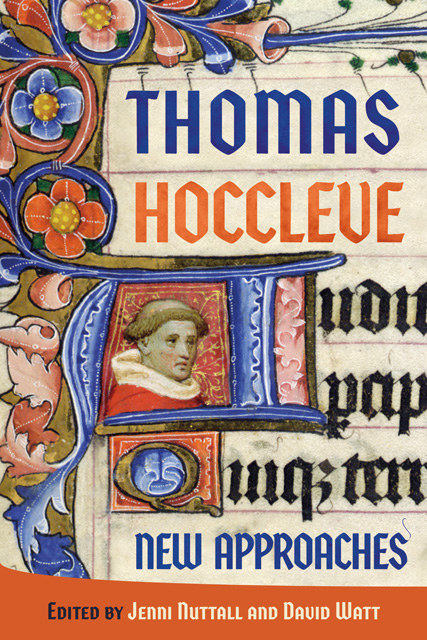10 - Curatorial Hoccleve: Spiritual and Codicological Illumination in the Regiment of Princes
Published online by Cambridge University Press: 11 January 2023
Summary
Hoccleve has long been connected with Chaucer’s literary legacy because he eulogises his predecessor in two passages in the Regiment of Princes (1958–74, 2077–107). His use of the terms maistir and fadir to describe Chaucer participates in what has been called a ‘genealogical metaphor’ of authorial lineage in late medieval literature, although Ethan Knapp has argued for that metaphor being a ‘strategy for poetic usurpation’. While the term ‘genealogical’ captures the affiliations of father and son and master and pupil (as well as the professional, bureaucratic, masculine culture that defines so many of Hoccleve’s social connections), it directs our attention away from Hoccleve’s use of book-related language and imagery as dominant motifs in the eulogising passages. Inspired in part by Sonja Drimmer’s contention that manuscript illustrations of late medieval English authors seek to establish their authorial status, this essay suggests that Hoccleve’s curation of Chaucer’s legacy, not least via the author portraits that accompany one of the passages in several manuscripts, is influenced by a broader material-cultural phenomenon. Hoccleve invokes the very aesthetics of reading a late medieval manuscript – the holistic impression of the page as generated by words, decoration, and illustration – as a means to secure the works and reputations of authors beyond their lifetimes. This article focuses especially on Hoccleve’s use of illumination, in both a codicological and a spiritual sense, to curate literary legacy.
I refer to Hoccleve’s practice as ‘curatorial codicology’ in order to describe it as a kind of pastoral care for the author’s memory that emerges from encounters with the written word in its multimodal manuscript context. As a professional scribe, Hoccleve participated in late medieval English scribal culture and copied a number of Middle English literary manuscripts. He also witnessed the development of Chaucer’s afterlife through the production and circulation of codices. As both author and scribe, he would have been aware of the sensory, performative, and even affective functions associated with the manuscript page.6 Hoccleve’s attitudes towards his literary maistirs thus intersect with his awareness of codicological curation: an interrelated network of verbal, graphical, and decorative elements on the page that can safeguard literary works and their authors, as if they are to be venerated as saints. Hoccleve’s curatorial codicology sees books as vehicles for preserving renown and facilitating exaltation.
- Type
- Chapter
- Information
- Thomas Hoccleve New Approaches , pp. 215 - 229Publisher: Boydell & BrewerPrint publication year: 2022



